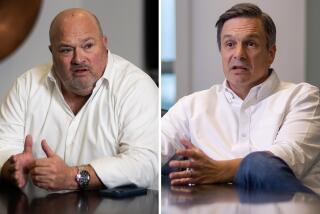Sinning Clerics, Public Shame: the Double Indemnity of the Self-Exalted
- Share via
First Jim Bakker. Now Jimmy Swaggart. In both cases the immediate reaction in mainstream America had a tone of delight in seeing the self-righteous exposed as sinners.
In Los Angeles, meanwhile, there was news of a darker sort--allegations that a visiting priest from Mexico had molested at least 18 altar boys.
Disparate as these situations are, they are linked in our perception of the clergy as being a cut above human frailty.
Religion and human failure have always been intertwined. At a political level, religion has a shameful history of justifying war and violence rather than peace. At an individual level, there always have been charlatans who were more interested in building personal fortune than in mediating a higher reality. The centrality of sin to religion is further seen in one of the important functions of all religions: to absolve the faithful of guilt through carefully evolved religious rituals.
Individuals who do not find in the practice of organized religion the means of renewal seek release in the confessional of the therapist’s office or some other secular equivalent. Similarly, nations whose wars are not justified by religion turn to secular ideologies for legitimation.
Thus, with religion and sin inherently connected, we should not be too surprised when the purveyors of absolution sin. This is the human condition, and clerics are no more immune from moral failure than doctors are spared from heart attacks or influenza.
There is a difference, however, between doctors who don’t follow their own advice about keeping fit and clerics who fail to live up to their own moral exhortations. We do not look to doctors as the personification of health; what we value is their expertise and knowledge.
The core of religion, on the other hand, is both moral and spiritual transformation. The founders of the historic religions embodied in their lives the values that they announced. Although we cannot expect all of their successors to achieve the same heights of moral vision and self-transcendence, we have a right to express disappointment when their actions reveal feet of clay.
Whatever one thinks of his theology and theatrical talents, the public confession of Jimmy Swaggart is noteworthy. Even if his tearful acknowledgement of moral impropriety was in the same emotional vein as his weekly TV preaching, he came before 7,000 worshipers in his church last Sunday with candor; there was no pretense at cover-up, no self-serving excuses, no scapegoating.
Also, although Jim Bakker might have been expected to revel in the fall of Swaggart--who was less than charitable when Bakker was forced from his ministry last March--his only comment this week was to cite the words of Jesus: “Ye who are without sin cast the first stone.”
While one might either celebrate or lament the moral downfall of these celebrity clerics, depending on one’s theological commitments, perhaps there is a deeper truth to be garnered.
Dostoevsky was correct when he wrote that human beings prefer miracle, mystery and authority to freedom and faith. That makes it a great temptation for clerics to substitute themselves, aided by their charisma, for the divine.
Yet when clerics sin, and do so in a manner that requires public confession, we are reminded of the profound truth that prophets of all religious traditions have proclaimed: The Creator is not to be mistaken for the creation, and placing ultimate faith in any human form, whether a person or a religious institution, is a form of idolatry.
Clerics will sin. They are mortals and not gods. Like the rest of us, they will not lose their guilt lightly. But, having taken on the role of symbolizing moral virtue, their integrity can be regained only through slow and deliberate restitution.
More to Read
Sign up for Essential California
The most important California stories and recommendations in your inbox every morning.
You may occasionally receive promotional content from the Los Angeles Times.













